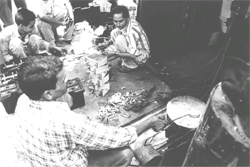Lead ing to disaster
Lead ing to disaster

in india, around 60,000 metric tonnes of lead from batteries are recycled illegally. Needless to say, they are done in smelting units situated in the backyards of residential areas. In 1994, the Central Pollution Control Board (cpcb) closed 110 such polluting backyard smelters in Delhi. Studies have revealed that their existence led to a high concentration of lead in adjoining agricultural fields, ambient air and in the groundwater in the city.
The demand for lead acid batteries in the country is increasing rapidly. According to a draft report, Lead acid battery recycling in India, prepared by Srishti, a non-governmental organisation, almost 70 per cent of the total lead used in the country, about 1,00,000 metric tonnes, is consumed in this manner. The organised sector depends largely on backroom assemblers and illegal smelters.
"These unorganised lead smelting units are a big threat to the environment because there is always a chance of lead contamination. These units recycle lead from the used batteries in a crude manner, which is highly detrimental to the environment,' the report adds.
The discarded batteries are broken down to recover the battery top and are placed in a bhatti ( mud furnace), to melt them. The recovered lead, which is 90 to 95 per cent pure is then poured into moulds to make pellets and sold at the rate of Rs 32-36 per kg. The plastic casing of the batteries are sold and the acid is drained out. Not only is this draining out of acid environmentally hazardous but the operation also emits lead dust, fumes and sulphur dioxide.
The consequences of such recycling are devastating. For example, studies in the Nangloi-Mundka area, where a number of such units were once in operation, revealed very high concentrations of lead in the soil. "In order to curb the rising lead pollution figures these illegal lead units are now banned in Delhi. There is no legalised lead smelter as this has been listed in the H (Hazardous) category,' says R K Goel, chairperson, Delhi Pollution Control Board. This recycling business is also growing because the big manufacturers display double standards. For example, Exide Corporation in the us has secondary lead smelting and plastic recycling units. However, in India these industrial giants refuse to follow the same process. Thus, the need of the hour is stringent laws to make battery recycling, by the manufacturers themselves, mandatory.
Written by Zulfia Nafees.







